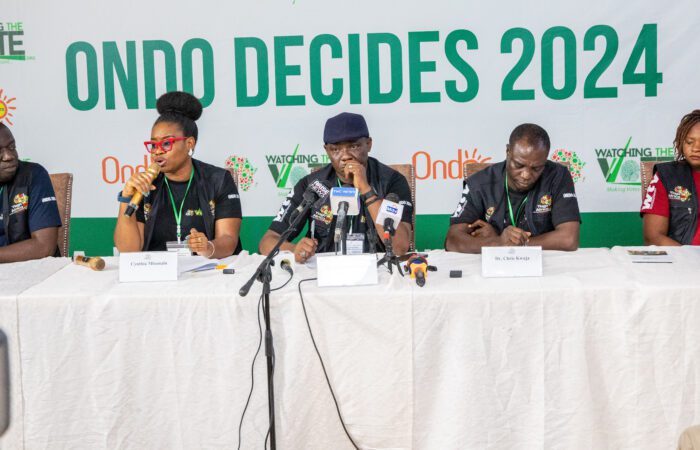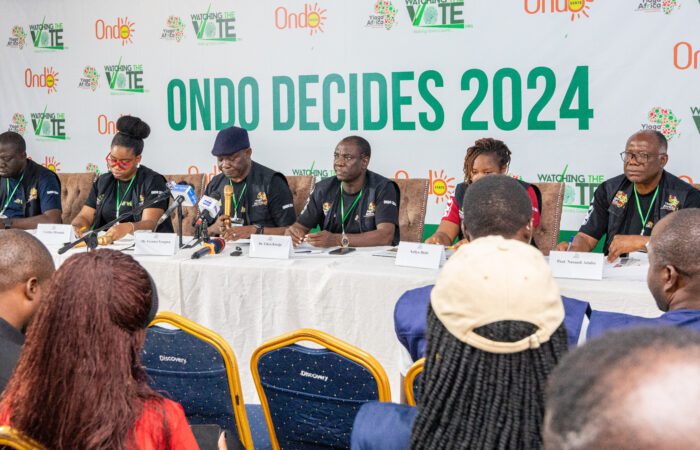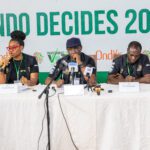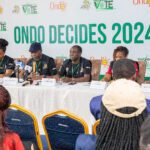Introduction
Ladies and Gentlemen, distinguished guests – welcome to the YIAGA AFRICA Watching The Vote (WTV)’s Press Conference on the conduct of the 9th March 2019 governorship election. This is the third press conference to be hosted by YIAGA AFRICA on the observation of March 9, Governorship elections.
Pursuant to our goal of promoting electoral integrity through non-partisan and independent citizens’ observation, YIAGA AFRICA deployed 682 observers to observe the governorship election in polling units, LGA and state result collation centers in the 642 LGA and 29 states. These include 642 stationary observers, 40 roving observers and an additional 8 working group members. YIAGA AFRICA deployed a robust election observation methodology that includes observation of election day process (from opening and setup of the polling units, accreditation, voting, announcement and posting of the official results) at the polling units and the result collation process at the 642 LGAs and 29 State Collation Centres. This enables YIAGA AFRICA access the conduct of election at both the polling units and collation centre.
#Watching The Vote Findings
The findings presented in this statement are based on information received from the WTV observers on the conduct of elections at the polling Units and the commencement of collation at LGA collation centers.
Findings from Polling Units
- Summary of Watching the Vote Findings on Polling Unit Set-Up and Opening
- As at 7:30 am, YIAGA AFRICA WTV observers reported that INEC officials had arrived at 56% of 663 polling units visited across the 29 States. By 9:00 am, 77% of 663 polling units visited had commenced accreditation and voting.
- 585 of polling units visited had 4 or more polling officials present, of which at least 2 are female. The polling units visited in the North West geopolitical zone had fewer women as polling officials than other zones.
- 95% of these 584 polling units visited, had security personnel.
- Of the 585 Polling units visited, APC party agents were seen in 76% polling units and PDP party agents in 97% polling units.
- Essential materials (register of voters, indelible ink/marker pen, polling official stamp, voting cubicle, ink pad, presidential ballot box and polling unit booklet) were present in 99% of 585 polling units. Specifically, Smart Card Readers were present in 99% polling units visited.
- Election Procedures at the Polling Units (Accreditation and Voting, Counting, Announcement and Posting of Official Governorship Results)
- The Smart Card Reader was used throughout the accreditation of voters in 98% of 625 polling units observed, while in 2% of these polling units, the Smart Card Reader was not used throughout the accreditation of voters.
- Not more than 5 persons were allowed to vote without PVC in 1% of the 625 polling units. No one was permitted to vote if their PVC could not be verified by the Smart Card Reader in 98% of the 625 polling units observed.
- In 93% of 622 polling units observed, INEC polling officials counted the number of unused governorship ballot papers. In 88% of these polling units, INEC polling officials counted the number of spoilt governorship ballot papers.
- In 86% of 622 polling units, INEC polling officials counted the number of counterfoils for the governorship ballot papers.
- In 97% of 622 polling units, INEC polling officials showed how every governorship ballot paper was marked to all party agents and observers present.
- Misconduct at the Polling Units
- Voters were intimidated, harassed or assaulted in 10% of 625 polling units observed, during accreditation and voting.
- INEC polling officials were intimidated, harassed or assaulted in 6% of 625 polling units during accreditation and voting.
- Women were intimidated, harassed or assaulted in 9% of the 625 polling units observed during accreditation and voting.
- Party agents attempted to influence voters or INEC polling officials in 18% of 625 polling units.
- Incidents of intimidation, harassments or violence during counting were reported in 7% of 622 polling units observed.
Findings on the Results Collation Process at the LGA Result Collation Centres
YIAGA AFRICA WTV deployed stationary observers to all 642 LGA and 29 states collation centers and is able to provide a nationwide assessment of the collation results process. This report provides findings as observed in LGA collation centers where WTV observers were allowed to observe and also only the LGAs where collation has commenced, concluded or almost concluded.
- Arrival and Commencement of Results Collation Process: WTV observers reported that collation officials arrived in 28% of 642 LGA collation centers before 6pm.
- Access to Result Collation Centers: In 3% of 542 LGA results collation centers, WTV observers were not allowed to observe.
- Presence of Security Personnel and Political Party Representatives: Security agents were present in 99% of the 543 LGA collation centers. An average of 9 party agents were seen these LGA collation centers.
- Results Collation Process:
- In 99% of 410 LGA collation centers, gubernatorial results Form EC 8B for all polling units from wards were submitted to the collation officer.
- In 99% of 408 LGA collation centers, collation official entered the votes for the gubernatorial election in the original form EC 8C in words and in figures.
- In 83% of 406 LGA collation centers, an INEC official crosschecked the total with the Electronic Collation Support Secretariat, for computational accuracy.
- In 50% of 407 LGA collation centers, an INEC official transferred the number of registered voters or polling units where the election was cancelled or not held from forms EC 40G to form EC 40 G(1) for all wards.
- In 97% of 407 LGA collation centers, INEC collation officers requested party agents present to countersign the results form.
- In 92% of 406 LGA collation centers, APC and PDP party agents present countersigned the results summary forms.
- In 72% of 406 LGA collation centers, other political party agents other than the APC and PDP party agents countersigned the results summary forms.
- In 96% of 407 LGA collation centers, INEC official distributed copies of the form EC 8C to the party agents and security agents present.
- INEC collation official did not publicly post the summary of the results in 23% of 407 LGA collation centers.
- Political party agent disagreed with the results declared in 10% of 406 LGA collation centers.
- There were incidents of intimidation, harassment or violence in 8% of 407 LGA collation centers.
- There was an attempt to disrupt the collation process in 7% of 407 LGA collation centers.
Reported Critical Incidents
YIAGA AFRICA received a total of 124 confirmed incidents reports during the governorship election some of these include;
- Voter Inducement and Vote buying: WTV observers reported cases of voter inducement and vote buying across the states. Specifically, YIAGA AFRICA received the most report of voter inducement and vote buying in Adamawa, Born, Nasarawa, Kwara, Oyo, Rivers, Kaduna and Zamfara States.
- Observers not allowed to observe at the LGA Collation Centres: Accredited observers and party agents not allowed to observe the collation process in Uruan, Ukanafun and Ikot-Ekpene LGAs in Akwa Ibom State, Ado LGA in Benue State, Ethiope East, Ughelli south and Ughelli North LGAs in Delta State, Asari-Toru, Eleme, Gokana, Opobo/Nekoro and Oyigbo LGAs of Rivers State, Silame and Yabo LGAs of Sokoto State, Tsafe LGA in Zamfara State, and in Ohaozara LGA collation center in Ebonyi State.
- Military Interference in the process: Incidence of military personnel chasing away observers and some party agents in some LGA collation centres were reported in Uruan, Ukanafun and Ikot-Ikpene LGAs of Akwa Ibom State, Ethiope East, Ughelli south and Ughelli North LGAs of Delta State and in Eleme, Gokona, Opobo/Nekoro and Oyigbo LGAs of Rivers State.
- Bypass of Result collation
Process: WTV observers reported cases where collation officers declined to
collate results at the LGA level or failed to announce results at the LGA
level in the following LGAs;
- In Amuwo-odofin LGA, the collation officer insisted on collating the results at the INEC state Ikeja office without stating any reason/explanation. This was the case in Orelope LGA in Oyo State; Ohaozara LGA collation center in Ebonyi State and Rimi LGA collation centre in Katsina State.
- In Ogbomosho LGA, Oyo state, the INEC officials refused to announce the governorship result at the INEC LGA secretariat but gave duplicate copies to party agents and security officials. The materials were later moved to Oyo state INEC secretariat at Agodi, Ibadan. In Abeokuta South LGA, the collation officers insisted on announcing the LGA Governorship result in the Ogun State INEC office. The duplicate copy of results was however given to APC, APM and PDP party agents.
- Disruption of the Results Collation: The announcement of the governorship results in Ibadan North LGA in Ibadan, Ahoada East LGA in Rivers state and Ibesikpo Asutan and Akamkpa LGAs in Akwa Ibom State were disrupted. There were reports of attempts to disrupt the LGA results collation process in Toungo and Hong LGAs in Adamawa State. In Hong, political thugs arrived the venue of the collation process in a vehicle branded with the logo one of the major parties and attempted to snatch ballot boxes, they were apprehended and one was killed and another sustained injury.
Issues and concerns
- Destruction of democratic Institutions: YIAGA AFRICA is concerned with efforts by the political class to undermine democratic institutions like INEC and Nigeria Police. This do-or-die attitude of the political class where agencies of state like the Nigerian army are deployed to interfere with the electoral process despite legal limits to their involvement in the elections is unacceptable. This could imperil Nigeria’s democracy if not addressed. YIAGA AFRICA condemns the destruction and vandalization of INEC offices all in bid to prevent the electoral commission from conducting elections. The common good should be the ultimate goal of public leadership but it appears, politicians are determined to subvert the electoral process for their personal gains.
- Declining integrity of the electoral process: The reports on non-compliance with electoral guidelines and procedures lapses in our electoral process could potentially undermine the integrity of elections. YIAGA AFRICA is concerned with the flagrant abuse of electoral guidelines on collation of results. In some cases, INEC officials instructed security agents to deny accredited observers access to results collation centres. This occurred in Ado LGA in Benue state, Osru LGA in Imo state, Rimi LGA in Katsina State and Yabo LGA in Sokoto state.
- Threat to press freedom and civil society: The attack on journalists and civil society actors during the 2019 elections is condemnable. During the March 9 elections, journalists and observers were intimidated, abducted and assaulted. For instance, a journalist with Premium Times was intimidated and abducted by thugs and party loyalists while on election duty for exposing underage voting in a polling unit in Plateau state. Watching The Vote observers were also intimidated and threatened while observing the elections.
- Poor voter turnout: Although, results collation is ongoing and a definite figure on turnout can only be determined after the election, YIAGA AFRICA notes the poor level of voter turnout for the elections. YIAGA AFRICA preliminary conclusion suggests that the poor turnout was occasioned by the loss of confidence in the electoral process, failure of political leadership to deliver on campaign promises, low voter mobilization, threat of violence and heavy security deployment. Low voter turnout has implications for political legitimacy and citizenship. A post-election audit will unravel the factors responsible for low voter turnout in the 2019 elections.
- Vote buying and selling: As noted in previous WTV observation reports, the March 9 elections was characterized with high level of vote buying and selling. In some centers, the election was determined by the highest bidder. What is most astonishing is the poor number of arrests despite reported cases of vote buying in the elections.
- Violence and extrajudicial killings: YIAGA AFRICA notes with great concern the level of violence resulting to loss of lives and destruction of properties. It is unacceptable that Nigeria continues to witness orgy of violence during elections. These incidences signal a decline in Nigeria’s democratic credentials.
YIAGA AFRICA Watching The Vote Recommendations
In view of the foregoing, YIAGA AFRICA WTV makes the following recommendations:
- INEC should proactively release information on the number of cancellations and reasons for the cancellations. This information should be provided to party agents at the collations centers and posted on INEC’s website.
- Application of the Margin of Lead Principle: YIAGA AFRICA call on INEC to ensure collation officers are abide by the guidelines and regulations on management of margin of lead principle. Results should not be declared and winner returned where the total number of registered voters in cancelled polling units will affect the margin of lead between candidates. This is in consonance with Section 26 and 53 of the 2010 Electoral Act as amended.
- YIAGA AFRICA calls on INEC to fast track the process of results collation and announcement. The electoral commission owes Nigerians an explanation on the reasons why results collation was suspended in some LGAs on election day. The transparency of the results collation process is central to the integrity of the elections and the acceptability of its outcome. Therefore, INEC must uphold the values of openness and integrity in the collation process as well as ensure all collation centers are accessible to accredited observers, media and party agents.
- Prosecution of electoral offenders: The March 9 elections was fraught with egregious violations of our law and human rights. YIAGA AFRICA calls for the prosecution of electoral offenders arrested by security. This includes the sanctions of military personnel who disrupted the process. Electoral malfeasance will persist if no perpetrator is brought to justice. It will amount to injustice to victims of electoral injustice if perpetrators are not held to account for their infractions.
YIAGA AFRICA commends Nigerians who turned out to vote in the March 9 Governorship, State Assemblies and Abuja Area Council Elections. YIAGA AFRICA calls on political parties and citizens to maintain the peace as the results collation process continues. INEC remains the only Institution with the legal mandate to announce election results and declare the winner as such citizens, political parties and their supporters should respect this mandate of the Commission and reduce the spread of misinformation.
YIAGA AFRICA undertook the Watching The Vote project to provide Nigerian voters, governorship candidates, political parties, civil society and INEC with independent information on the conduct of the elections. The Watching The Vote project is “Driven by Data – For All Nigerians – Beholden to None!”
Thank you and God Bless the people of Nigeria!
Dr. Hussaini Abdu
Chair, Watching The Vote Working Group
Samson Itodo
Executive Director, YIAGA AFRICA
For media inquiries please contact: Moshood Isah, Communication Officer
Tel. +234 (0) 703 666 9339 Email: misah@yiaga.org
Learn more about #WatchingTheVote at www.watchingthevote.org or on social media on Facebook at facebook.com/yiaga.org or on Twitter @YIAGA.






